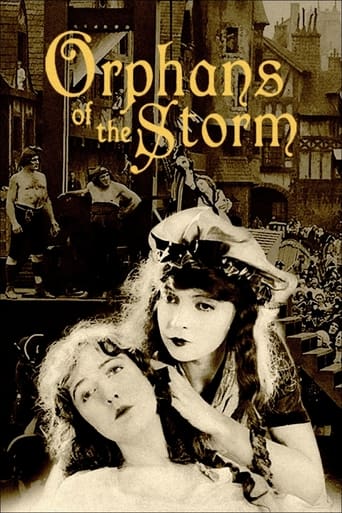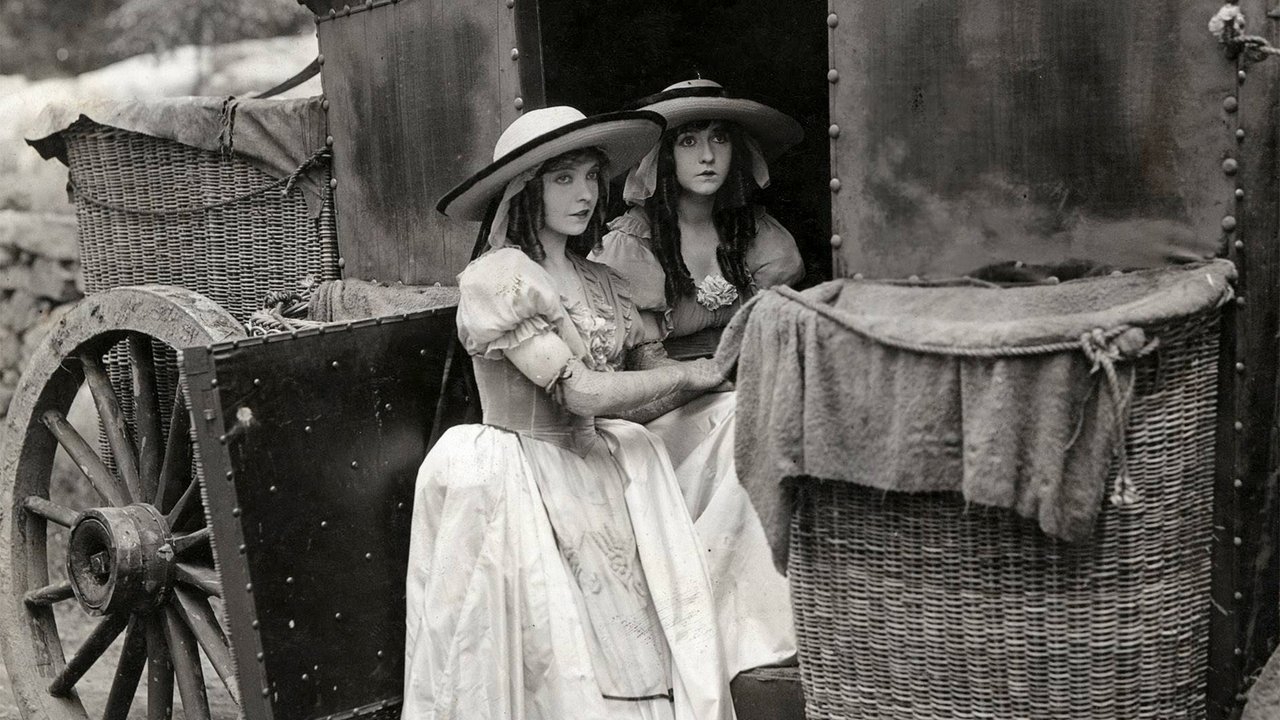bbrooks94
D.W. Griffith's monumental epic about two sisters swept up in 18th Century Paris before, during and after the French Revolution is a masterwork in storytelling, direction and social comment, with Griffith attacking both the nature of 'mob' and aristocratic rule. On both sides of the revolution there are unpleasant, greedy individuals bent on destruction. The story is touching, Griffith's use of colour filters a welcome touch to the atmosphere and scenes, which are crafted and composed to perfection. Costumes, sets and setpieces all look beautiful. There are dozens of characters, some real life figures, such as Robespierre or Danton, each one with a uniquely crafted personality and well performed. Lillian Gish is truly astounding. The story may indeed be riddled with clichés and dramatic coincidences, but Griffith edits the film so well that you admire these moments, rather than cringe at them. I know Griffith is essentially notorious for only one film, which has no doubt swiped a gaping scar across the rest of his career, but he truly was a master.
Neil Doyle
ORPHANS OF THE STORM is quite an impressive looking silent film from D.W. Griffith, who was obviously the Cecil B. DeMille of his day. He has an instinct for showing surging crowd scenes involving all the unrest during the French Revolution and these scenes are highly detailed and very arresting visually. All the sets and costumes look as though a lavish budget was spent on this story of two sisters who survive the French Revolution after many melodramatic twists and turns of their fortune.DOROTHY GISH and LILLIAN GISH are the sisters, with Dorothy as the blind waif who is separated from her sister when an overly amorous nobleman orders Lillian to be brought to his orgy. From there on, the Dickensian plot becomes thicker and thicker as the girls suffer one indignity after another in order to survive.LUCILLE LaVERNE is the old hag (she later was the model for Disney's Wicked Witch in "Snow White"), a harridan who makes Dorothy a beggar in the streets. "You'll shiver better without a shawl," is one of her immortal lines.Joseph SCHILDKRAUT is very impressive in an early American screen role, demonstrating charm and skill of the kind that would land him important parts in future costume films like "Marie Antoinette." MONTE BLUE is Danton, a man who meets LILLIAN GISH early in the story and later becomes the defender who saves her and Schildkraut from the guillotine.It's all very melodramatic, the acting ranging from overdone to wildly overdone. Griffith was never subtle in asking his performers to give it their all. Excessive wringing of hands, eye-rolling to show anguish, fierce looks to show hatred, etc. may cause unintended chuckles when viewed by today's audiences, but there is never any letdown in the telling of a compelling story using the French Revolution as rich background material for a tale of villainy and heroism.A fascinating silent film with an appropriate film score added to give the story even more force and flavor.Summing up: Overlong drama, but compelling from the start to the feverishly melodramatic end.Exquisite close-ups of Lillian Gish are touching and lend poignant charm to her performance.
carvalheiro
"Orphans of the storm" (1921) directed by D.W.Griffith is one of the most important movies ever made in silent cinema, which took the French revolution as target of nowhere unhappiest disgrace to explain maybe by contagion the near happening of another revolution, like the Bolshevik, less obviously maybe and its uncontrolled terror of state mixed with defense motivation. Griffith was here in this movie in the plenitude of his strength as interpreter of a kind of unfortunate conception about evolution of Europe history, taking an option for the goodness to the losers, even if their relatives were responsible directly or indirectly for the state of hungry and the consequent disorganization for the supplies in that society, with the people's savings lost and surviving only with unrest in countryside namely. The style of editing close shots alternatively with some long shots and even the so-called American shots - that was and still is in the half figure subject by his or her chest - as though the variety of compositions and also its shapes inside for a photography made by his fellow Billy Bitzer it seems - but he was out of the credits giving his name to another cinematographer - and the style of a dramatic issue for the romantic story below the tragic events, put this movie still now at high level for an utmost and better context, for another answer to the problem of an issue for the revolution. Independently of the destiny of human beings but as the result of contradictions made by development and its bad distribution between humankind and the people, in splitting classes or in hierarchies against the production of means of wealthy. The story in itself comparing the children in the storm as orphans in between the adventure of their abandoned souls, when it was implanted the system of the three powers after the first big crisis of legitimacy of the ancient regime, because the kingdom absolutism without possible issue at short term in France, surely is the better moment of this movie. Just while in it the characters rolling the eyes round the sockets, as typical touch of the silent drama since Griffith particularly. Surely with the dissolution of customs within these families linked with the propriety of the soil, the owner each own with its heraldic condition, symbolizing strength and the mercy for such a couple of young girls, in a storm for their poor lives at mercy of circumstances as guillotine and Danton's help. Personally which seems an exaggeration from the story, as told by an aristocratic version of a more liberal and perfunctory conception of reflux from the historical movement since Thiers. It is thinkable that the scene with the crowd in exciting mood, with the impression of lack of pity for the convicted on the convoy, it made the matter of the emotions from the viewer, as the execution on the place before the people, in such an exaggeration from the skilled editing of the scene of excited crowd, in an overwhelming way of specific kind of agitation and insensitivity for the mortal ceremony. The strength of its expressively beauty for which it was told also as the so-called salvation from the last minute, typically from the artistic conception of Griffith, whose weakness it was nonetheless understandable by the fault of its amplification, at the level of public service before the opinion of the incendiary times. Incompatible with the needs of a romantic contrast as essence of sweet melodrama, with such a photographic reconstitution - of such a range of details and tears of the victims - there of vengeance, as return for fixing the past with much more poetry.
hcoursen
This film demonstrates Griffith's genius in creating a massive scale and in linking disparate plot elements. By 1921, however, some of Griffith's innovations had become mere mannerisms, particularly the cross-cutting that leads to his climax, as introduced in "Birth of a Nation" and used, with powerful effect, in "Hearts of the World." The cross-cutting at the end of "Orphans" goes on much too long. Lillian Gish must have grown old staring down into the basket. Some techniques -- a blank screen followed by a face (memory) and a narrow focus on a face (point of view), for example, are still effective. I know that over-elaboration is a staple of the silent screen, but at times, it is over-the-top here. Constrast, for example, the more subtle approach of an actor like Alice Terry. Danton did argue for moderation, once he believed that the Revolution had succeeded. His oration in this film is, like much of it, simply unbelievable. The idyllic ending also strains credulity. How did this particular group of aristocrats escape the blade and retire to a country estate?


 AD
AD



